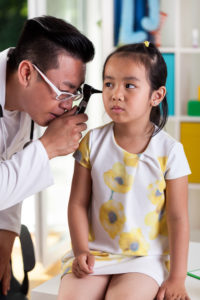
Did you know that ear infections are much more common in children than adults? What makes our little ones more susceptible to these infections? Dr Leong Hoo Kwong, Consultant ENT Surgeon at Nobel ENT Centre, shares about ear infections of the middle and outer ear, and what parents should know to help their children.
What are ear infections?
Ear infections are common in young children, and they can affect the outer or middle-ear. An outer ear infection affects the lining of the ear canal, whereas an infection of the middle-ear affects the air-filled space behind the eardrum that contains the tiny vibrating bones of the ear, also known as the middle-ear.
Difference between outer ear infection and middle ear infection
- Outer ear infection – an outer ear infection sometimes starts as an itchy rash, the ear may become painful, red, and swollen.
- Middle ear infection – caused by fluid trapped behind the ear drum, usually accompanied by fluid drainage from the ear, as well as a fever in some cases.
Ear Infection Symptoms in Children
Symptoms of an outer ear infection can include ear pain, itching, difficulty hearing or ear discharge.
If your child has a middle-ear infection, they may have a fever, headache, nausea and vomiting. They may also feel irritable, drowsy, and a loss of appetite. Younger children may express this discomfort by fulling on their ear or poking their fingers inside the ear. The infection can cause the eardrum to rupture and produce a thick and possibly bloody discharge.
Outer Ear Infection: Otitis Externa
An outer ear infection is also known as otitis externa, and sometimes called swimmer’s ear, as it is often the result of water remaining in the ear after swimming or bathing. The moisture in the ear breeds bacteria which causes the infection.
Middle Ear Infection with Effusion: Otitis Media (OME)
Some children have recurrent middle-ear infections, and this can lead to chronic otitis media. This is also known as “glue ear”, in which there is thick fluid in the ear. It usually occurs due to the malfunction of the Eustachian tubes, which connect the middle ear to the back of the nose which allows ventilation and proper function of the middle-ear mechanism.
The infection often begins with a cold or other respiratory problem, which leads to the swelling and blockage of the Eustachian tubes. This prevents fluid from draining from these tubes and build up against the eardrum.
Young children are more prone to this as these tubes are shorter and softer in young children and some 60 percent of children have at least one episode by the age of six. It frequently resolves itself, but may take up to three months, and can cause a child to have difficulty in hearing and result in speech, language and other developmental delays as well as behavioural problems like poor attention.
Seeing a doctor
You should take your child to visit a doctor when you suspect they have a ear infection. The doctor may prescribe ear drops for outer-ear infections, or antibiotics if they have a middle-ear infection.
For cases of glue ear, tubes may be inserted to prevent accumulation of fluid in the middle ear, and help to restore the child’s hearing. If your child has had recurrent ear infections, hearing tests may also need to be done to ascertain any hearing damage.
Preventing ear infections
You can help your child to reduce their risk of developing ear infections.
- Prevent common colds and illnesses – practising good hygiene and not sharing food or utensils, avoiding other children who are sick
- Get your vaccinations – keep up to date with your child’s vaccination schedule. Vaccinations such as pneumococcal and haemophilus vaccines, to prevent pneumonia and meningitis, and reduce the risk of ear infections.
- Keep the ear dry, especially after bathing or swimming.
- Avoid second-hand smoke – make sure no one in smokes in your home. Keep to smoke-free environments when outside.




